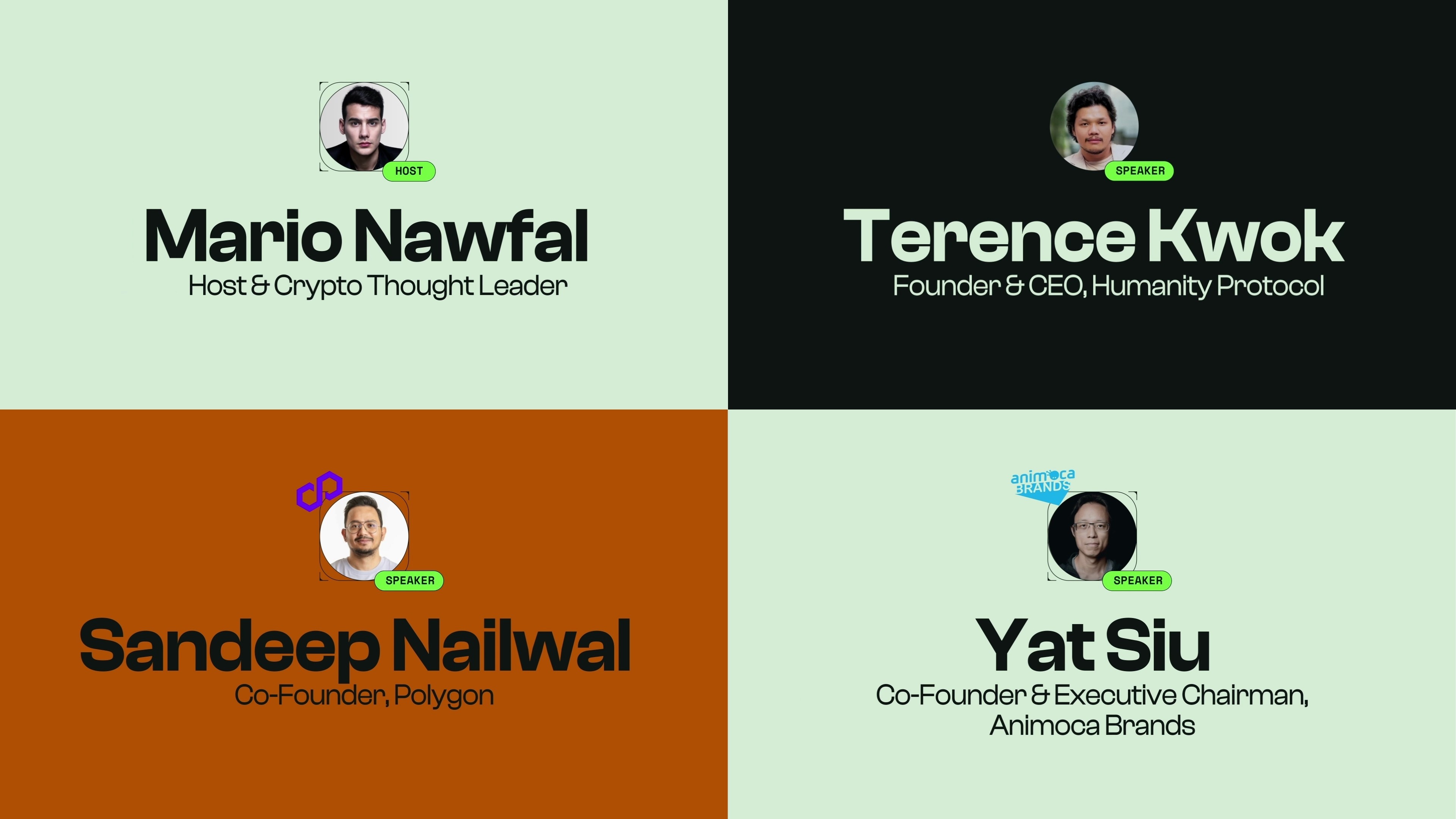Insights from the Next Frontier of Identity: Terence Kwok Discusses Humanity Protocol with Other Industry Giants
Last month, Humanity Protocol's founder, Terence Kwok, joined one of the most exciting Twitter Spaces we’ve had to date alongside industry heavyweights.
Dec 2, 2024
Company
Last month, Humanity Protocol's founder, Terence Kwok, joined one of the most exciting Twitter Spaces we’ve had to date alongside industry heavyweights to explore some of the most pressing issues in Web3, decentralized identity, and the growing threat of bots and AI.
He sat down with one of the most prolific roundtable hosts and Humanity Protocol investor, Mario Nawfal, as well as two other heavyhitters — Sandeep Naliwal of Polygon and Yat Siu of Animoca Brands to discuss all things Humanity Protocol, reaching a whopping 1 million Human IDs on testnet, and where the project is headed this bull market.
Their sit-down shed light on the biggest challenges facing the digital identity landscape and how Humanity Protocol’s Proof of Humanity stands out in a saturated landscape of other digital identity projects.
Check out the full conversation here.
Here’s a recap of the most important topics discussed during the session and Terence’s most memorable quotes.
Verifying Human Identity in an AI-Driven World
One of the standout themes was the rise of AI-generated deepfakes and the urgent need for reliable human verification systems. Terence highlighted how current identity verification methods like CAPTCHA and traditional biometrics are inadequate.
“With deepfakes on the rise, Humanity Protocol focuses on creating an unspoofable way to verify human presence without sacrificing user privacy.” — Terence Kwok
He explained how Humanity Protocol’s palm biometric technology offers a robust solution by leveraging unique vein patterns that are nearly impossible to replicate. Unlike facial recognition, which can be fooled by deepfakes, palm biometrics provide an unforgeable proof of humanity, ensuring only real users can access key digital services.
Building the largest ID graph on Web3
The conversation then revolved around how Humanity Protocol is fundamentally different from projects like Worldcoin. Terence emphasized the importance of Identity Validators — trusted entities such as universities or financial institutions that can issue credentials without centralizing user data.
The Proof of Humanity’s mechanisms ensure that users maintain control over their data, sharing only what’s necessary. Validators can confirm credentials with simple yes/no outputs, eliminating the need to store sensitive information on-chain.
“Humanity Protocol puts the power of identity back in users’ hands by enabling verifiable credentials without compromising privacy.”
Fighting Bots
Terence and the panel also dove into the growing problem of bots manipulating online systems. From social media engagement to financial markets, bots undermine the integrity of digital ecosystems. Humanity Protocol’s innovative approach bypasses traditional CAPTCHAs, using Humane Scanners and biometric verification to ensure only real users engage with platforms.
The conversation also touched on how the protocol creates economic disincentives for bots by ensuring rewards and access are only available to verified humans.
“It’s not just about identifying bots—it’s about making the digital economy sustainable for real people.” — Terence Kwok
Rapid User Growth and the Road Ahead
One of the most impressive achievements discussed was the 1 million users Humanity Protocol onboarded in just 52 days since its testnet launch — a testament to the growing demand for decentralized identity solutions. Compared to Worldcoin’s timeline to reach similar milestones, Humanity Protocol’s rapid growth demonstrates the scalability and appeal of its biometric-based verification system.
The discussion also covered the protocol’s recent private valuation of $1 billion, with top-tier investors on its cap table, solidifying its position as a leader in the decentralized identity space.
Our Vision for the Future
Wrapping up the conversation, Terence shared his vision for Humanity Protocol as more than just a product—it’s a movement to protect human agency in the digital age. He envisions a future where identity is not controlled by centralized authorities but instead secured through community-driven, decentralized networks.
“We’re building something bigger than identity verification. We’re creating a new standard for trust in the digital world.” — Terence Kwok
Final Thoughts
This Twitter Space offered a rare glimpse into the forces driving Humanity Protocol. As AI, bots, and digital impersonation become more sophisticated, Terence and the HP team are committed to ensuring that humans retain control over their identities and enjoy a better online experience.
With decentralized validators, innovative biometric solutions, and a clear focus on privacy, Humanity Protocol is leading the charge in shaping the future of digital identity.
Stay tuned as Humanity Protocol continues to push the boundaries of what’s possible in decentralized identity.
